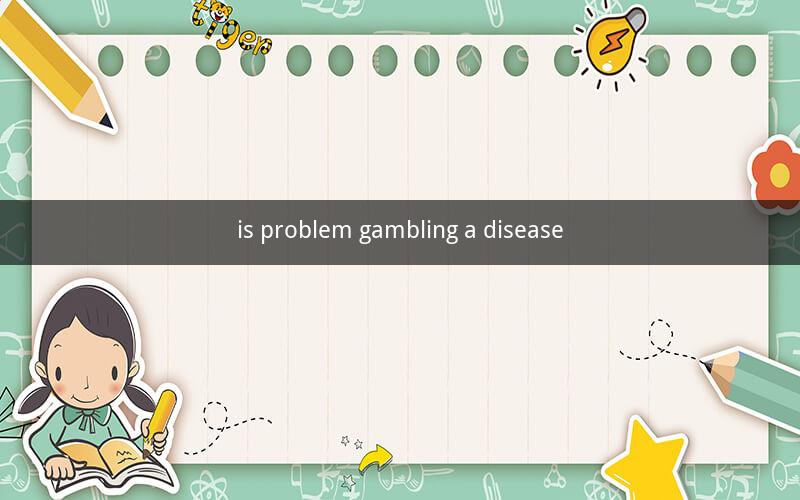
Contents
1. Understanding Problem Gambling
2. Defining Problem Gambling as a Disease
3. Symptoms and Signs of Problem Gambling
4. The Impact of Problem Gambling on Individuals and Society
5. Causes of Problem Gambling
6. Risk Factors for Problem Gambling
7. Diagnosis and Treatment for Problem Gambling
8. The Role of Family and Support Systems
9. Prevention and Education Programs
10. The Future of Problem Gambling Research
1. Understanding Problem Gambling
Problem gambling is a complex disorder that affects individuals of all ages, backgrounds, and socioeconomic statuses. It involves the repeated engagement in risky gambling behavior that leads to significant negative consequences in various aspects of life, such as personal, financial, and professional domains.
2. Defining Problem Gambling as a Disease
Problem gambling has been recognized as a mental health disorder by several professional organizations, including the American Psychiatric Association (APA) and the World Health Organization (WHO). The APA includes problem gambling in its Diagnostic and Statistical Manual of Mental Disorders (DSM-5) under the category of addictive disorders, classifying it as a disease.
3. Symptoms and Signs of Problem Gambling
Symptoms and signs of problem gambling may vary among individuals, but some common indicators include:
- Preoccupation with gambling, spending a significant amount of time planning, thinking, and fantasizing about gambling.
- Needing to gamble more money to achieve the desired level of excitement or to recoup losses.
- Feeling restless or irritable when attempting to cut down or stop gambling.
- Continuing to gamble despite negative consequences, such as financial, relationship, or health problems.
- Risking or losing relationships, jobs, or educational or career opportunities because of gambling.
4. The Impact of Problem Gambling on Individuals and Society
The impact of problem gambling on individuals and society is profound. It can lead to financial ruin, increased debt, job loss, broken relationships, and even suicidal thoughts or attempts. Societally, problem gambling can strain healthcare systems, social services, and law enforcement agencies.
5. Causes of Problem Gambling
Several factors can contribute to the development of problem gambling, including:
- Genetic predisposition
- Environmental influences, such as exposure to gambling activities or models of gambling behavior
- Psychological factors, such as a need for excitement, a desire to escape reality, or coping with stress
- Social factors, such as peer pressure or living in a culture that normalizes gambling
6. Risk Factors for Problem Gambling
Risk factors for problem gambling may include:
- Younger age
- Males
- Previous gambling-related problems
- Family history of gambling or other addictive disorders
- Co-occurring mental health disorders, such as depression or anxiety
- Impaired impulse control
7. Diagnosis and Treatment for Problem Gambling
Diagnosis of problem gambling can be made through clinical assessment by a mental health professional. Treatment options may include:
- Cognitive-behavioral therapy (CBT)
- Medication for co-occurring mental health disorders
- Support groups, such as Gamblers Anonymous
- Inpatient or outpatient treatment programs
8. The Role of Family and Support Systems
Family members and support systems play a crucial role in the recovery process. They can provide emotional support, encourage participation in treatment, and help create a supportive environment that promotes recovery.
9. Prevention and Education Programs
Prevention and education programs can help raise awareness about problem gambling and its potential consequences. These programs may include:
- School-based programs that educate students about responsible gambling
- Public awareness campaigns that promote the dangers of problem gambling
- Resources for individuals seeking help for gambling-related problems
10. The Future of Problem Gambling Research
Research on problem gambling continues to evolve, with new findings that can inform treatment approaches and prevention strategies. Future research may focus on:
- Identifying specific genetic factors that contribute to problem gambling
- Developing more effective treatment interventions
- Exploring the role of technology in preventing and treating problem gambling
Questions and Answers
1. Q: Can problem gambling be cured?
A: While problem gambling can be treated and managed effectively, it is a chronic condition that may require ongoing support and intervention.
2. Q: Are there any medications available for treating problem gambling?
A: Medications may be prescribed to address co-occurring mental health disorders or to help with cravings related to gambling.
3. Q: Can family therapy help with problem gambling?
A: Yes, family therapy can be beneficial in addressing the impact of problem gambling on family members and supporting the individual's recovery process.
4. Q: How can I identify if someone I know has a problem with gambling?
A: Look for signs such as preoccupation with gambling, increased financial debt, and changes in behavior or relationships.
5. Q: Are there any support groups available for individuals with problem gambling?
A: Yes, support groups like Gamblers Anonymous provide peer support and resources for individuals struggling with problem gambling.
6. Q: Can problem gambling be prevented?
A: Prevention efforts can be effective, particularly through education and awareness campaigns targeting young people and those at risk for developing problem gambling.
7. Q: What is the most effective treatment for problem gambling?
A: The most effective treatment for problem gambling often involves a combination of cognitive-behavioral therapy, support groups, and medication, if needed.
8. Q: Can problem gambling lead to addiction?
A: Yes, problem gambling can lead to addiction, as it involves compulsive and uncontrollable behavior that can have severe consequences.
9. Q: Are there any legal consequences for problem gambling?
A: Legal consequences may vary depending on the severity of the gambling behavior and the laws in the individual's jurisdiction.
10. Q: How can I support someone with problem gambling?
A: Support someone with problem gambling by providing empathy, understanding, and encouragement to seek help and participate in treatment.